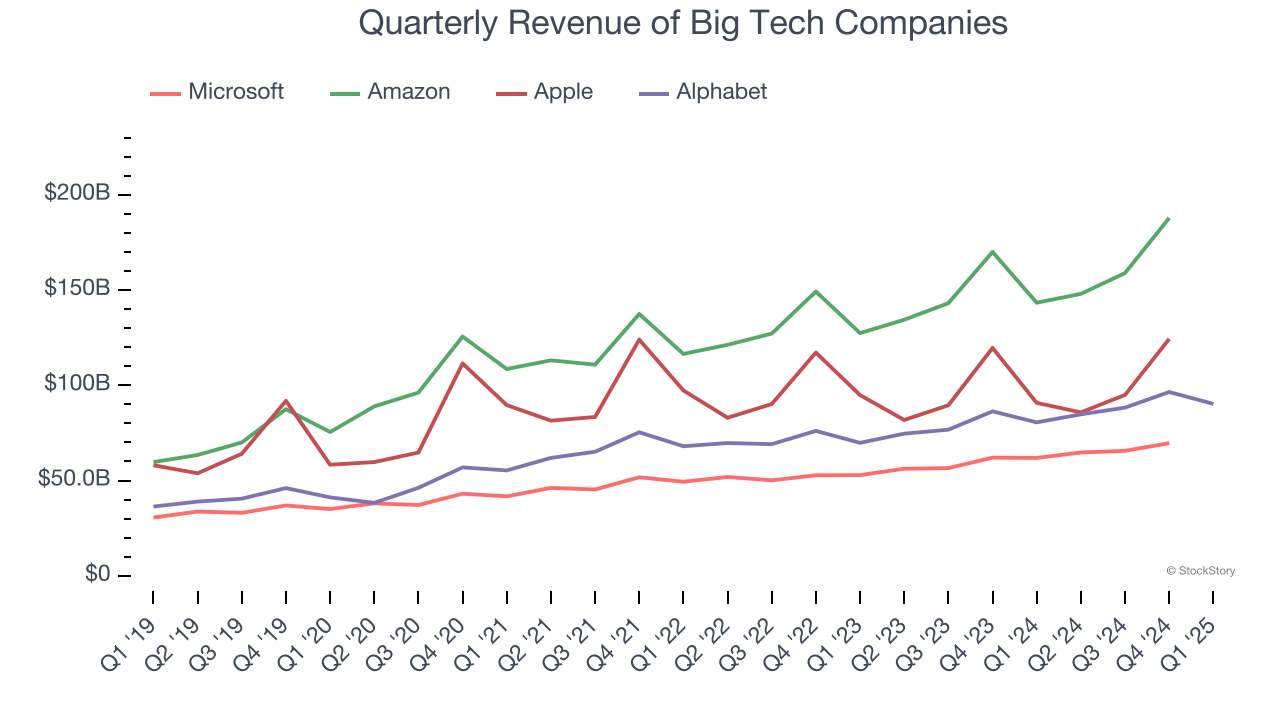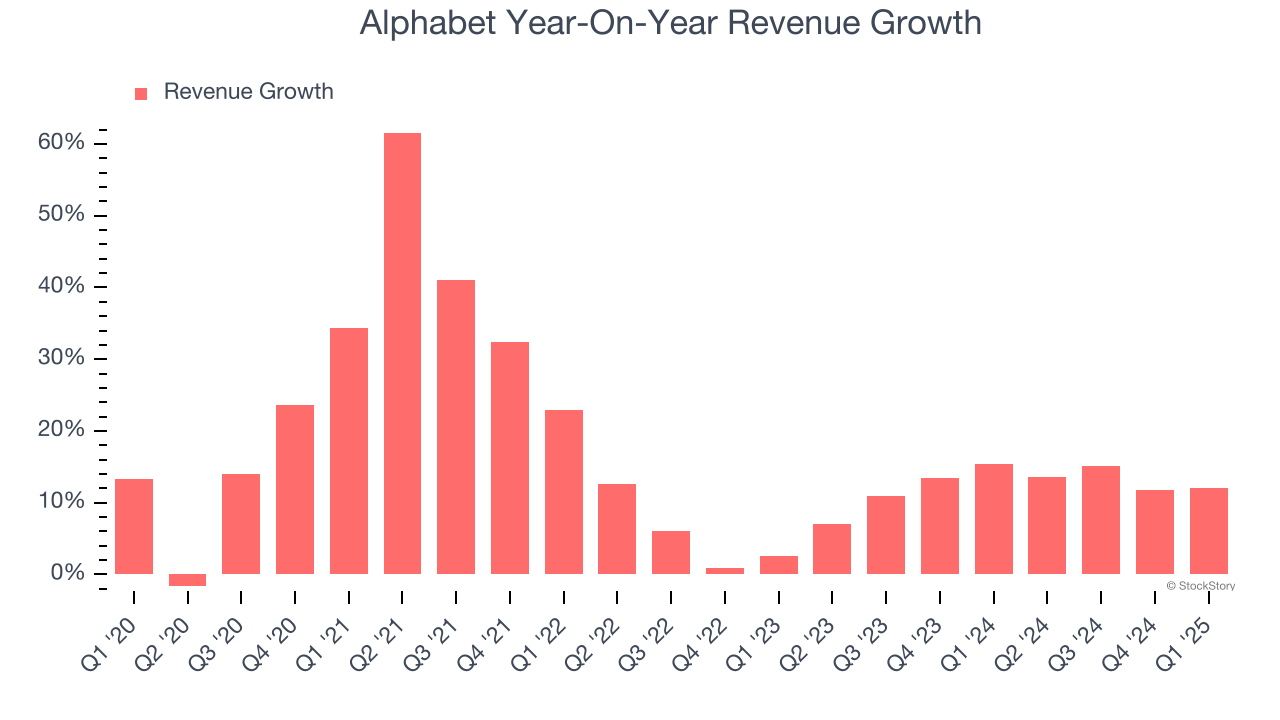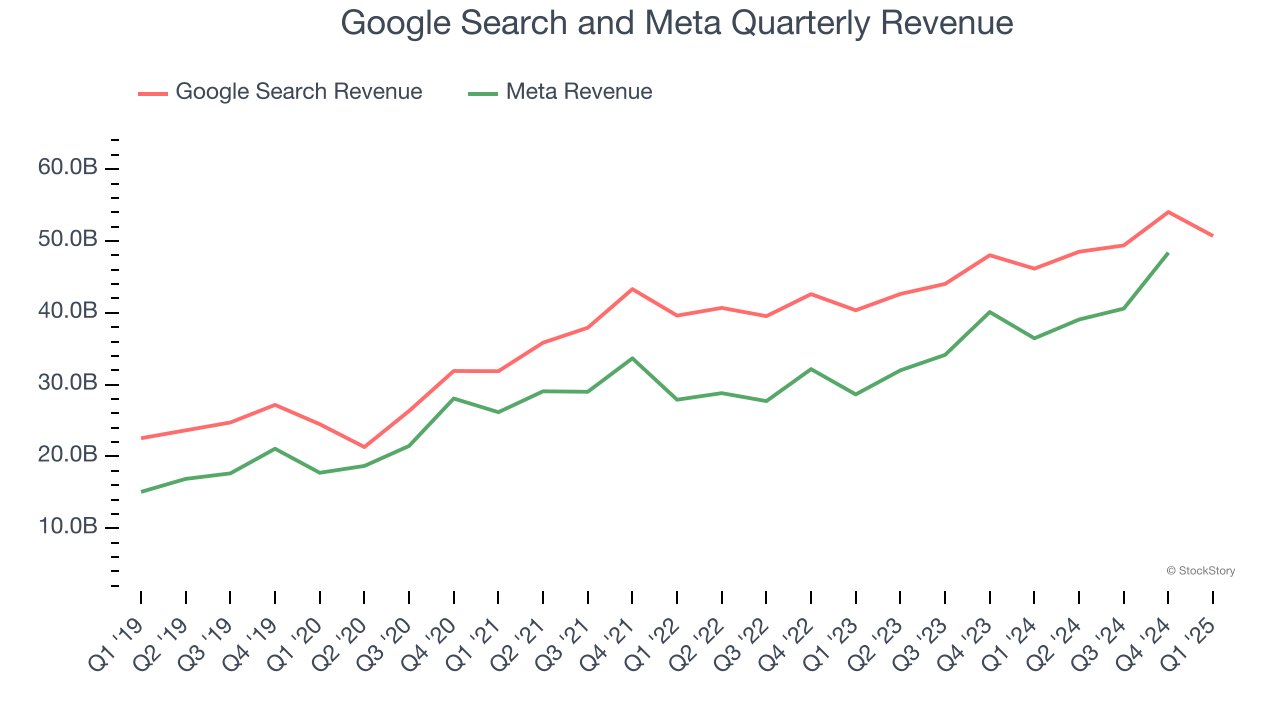
Online advertising giant Alphabet (NASDAQ: GOOGL) announced better-than-expected revenue in Q1 CY2025, with sales up 12% year on year to $90.23 billion. Its GAAP profit of $2.81 per share was 40.1% above analysts’ consensus estimates.
Is now the time to buy Alphabet? Find out by accessing our full research report, it’s free.
Alphabet (GOOGL) Q1 CY2025 Highlights:
- Revenue: $90.23 billion vs analyst estimates of $89.16 billion (1.2% beat)
- Operating Profit (GAAP): $30.61 billion vs analyst estimates of $28.73 billion (6.5% beat)
- EPS (GAAP): $2.81 vs analyst estimates of $2.01 (40.1% beat)
- Google Search Revenue: $50.7 billion vs analyst estimates of $50.38 billion (small beat)
- Google Cloud Revenue: $12.26 billion vs analyst estimates of $12.27 billion (small miss)
- YouTube Revenue: $8.93 billion vs analyst estimates of $8.95 billion (small miss)
- Google Services Operating Profit: $32.68 billion vs analyst estimates of $30.19 billion (8.3% beat)
- Google Cloud Operating Profit: $2.18 billion vs analyst estimates of $1.9 billion (14.8% beat)
- Operating Margin: 33.9%, up from 31.6% in the same quarter last year
- Free Cash Flow Margin: 21%, in line with the same quarter last year
- Market Capitalization: $1.91 trillion
Key Topics & Areas Of Debate
AI is likely the hottest topic in the world of investing today. Regarding Alphabet, the debate is about how AI’s advancement will impact the company’s bread-and-butter Search business. It is a business where Alphabet has dominant market share, and it is also highly profitable.
Will the development of AI hurt Alphabet because OpenAI’s ChatGPT and even Microsoft’s Bing will take market share from Google, once thought to be nearly invincible in the online search market? Or will Alphabet’s Gemini product, first announced in December 2023, allow the company to dominate the Search market for years or even decades to come given its brand recognition?
As background, Gemini is designed to advance natural language understanding and meet certain thresholds in conversational and contextual understanding. In short, it is meant to provide even more accurate and personalized results, which would be a replay of what made Google so successful decades ago.
Despite its scale and dominance, Alphabet doesn’t operate in a vacuum. ChatGPT and Microsoft’s (NASDAQ: MSFT) new and improved Bing engine are current competitors to Google Search while Meta (NASDAQ: META) is extending beyond social media and into the online search market with its AI-powered assistant.
Alphabet runs into Microsoft often, as it is also one of its primary adversaries in the public cloud services market along with Amazon’s formidable AWS (NASDAQ: AMZN). Finally, Netflix (NASDAQ: NFLX), Disney (NYSE: DIS), and many other video streaming platforms go head-to-head against the company’s YouTube segment.
Revenue Growth
Alphabet shows that fast growth and massive scale can coexist despite the conventional wisdom about the law of large numbers. The company’s revenue base of $166.6 billion five years ago has more than doubled to $359.7 billion in the last year, translating into an incredible 16.6% annualized growth rate.
Alphabet’s growth over the same period was also higher than most of its big tech peers, Amazon (17.9%), Microsoft (14.3%), and Apple (8.1%). This is an important consideration because investors often use the comparisons as a starting point for their valuations. With these benchmarks in mind, we think Alphabet is cheap.

We at StockStory emphasize long-term growth, but for big tech companies, a half-decade historical view may miss emerging trends in AI. Alphabet’s annualized revenue growth of 12.4% over the last two years is below its five-year trend, but we still think the results suggest healthy demand.

This quarter, Alphabet reported year-on-year revenue growth of 12%, and its $90.23 billion of revenue exceeded Wall Street’s estimates by 1.2%. Looking ahead, sell-side analysts expect revenue to grow 9.8% over the next 12 months, a slight deceleration versus the last two years. This projection is still healthy and illustrates the market sees some success for its newer products.
Software is eating the world and there is virtually no industry left that has been untouched by it. That drives increasing demand for tools helping software developers do their jobs, whether it be monitoring critical cloud infrastructure, integrating audio and video functionality, or ensuring smooth content streaming. Click here to access a free report on our 3 favorite stocks to play this generational megatrend.
Google Search: Alphabet’s Bread-and-Butter
The most topical question surrounding Alphabet today is: “Will new Generative-AI products like ChatGPT and Meta AI disrupt Google Search and its 80%+ market share?”.
Although OpenAI (creator of ChatGPT) doesn’t disclose its financials, we can gain further insight by comparing Google Search to Meta and Microsoft’s Bing. Meta essentially has a monopoly in social media advertising and is creeping into search with Meta AI, which is powered by its Llama large language model, while Bing is the distant number two search engine that benefits from its integration with ChatGPT.
Starting with Alphabet, Google Search is by far the most considerable portion of its revenue at 56.3%, and it grew at a 15.2% annualized rate over the last five years, slower than total revenue. The previous two years also saw deceleration as it grew by 11.4% annually, though this isn’t concerning since it’s still expanding quickly.
Google Search's two-year result was lower than Meta’s 18.8%, showing digital advertising dollars could be flowing to Meta because of its improved AI algorithms and targeting capabilities. Alphabet bulls would argue this trend could reverse because the return on investment from keyword-driven advertising is more tangible, but that hasn’t been the case lately.

Quarterly performance is particularly relevant for Alphabet because it captures the growth of AI and signals whether investors are overestimating its competitive impact. Google Search revenue met Wall Street’s consensus estimates in Q1 and recorded a year-on-year increase of 9.8%.
While this was slower than Bing’s 20%, it’s important to consider that Bing has a much smaller revenue base and doesn’t pose a significant threat yet. Still, Alphabet must either start topping Google Search projections or outperform in other segments like Google Cloud Platform and YouTube to satisfy the market.
Key Takeaways from Alphabet’s Q1 Results
We liked that Alphabet beat analysts’ consolidated revenue, operating profit, and EPS expectations this quarter. On the other hand, Google Cloud and YouTube each missed Wall Street's segment revenue expectations by a small amount (Search's revenue beat drove the consolidated beat). Still, we think this quarter featured some important positives, especially amidst macro uncertainty. The stock traded up 4% to $165.40 immediately following the results.
Alphabet put up rock-solid earnings, but one quarter doesn’t necessarily make the stock a buy. Let’s see if this is a good investment. When making that decision, it’s important to consider its valuation, business qualities, as well as what has happened in the latest quarter. We cover that in our actionable full research report which you can read here, it’s free.







